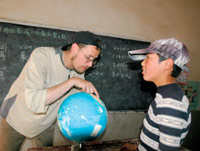An American volunteer in China


To locals, 36-year-old David Deem seems a particularly tall and slim American. He stands at 1.93 meters (6 feet 4 inches), with blue eyes, curly blond hair, a beard, and an honest and bright smile. They call him "Ding Dawei."
Ding Dawei has been in Dongxiang Autonomous County in northwest China's Gansu Province since 2000, voluntarily helping with the elementary education of children. He came to work in China in 1994, and before coming to Dongxiang he was with the Northwest Minorities University for seven years as an English teacher.

"A Teacher Should Go Where He Is Needed Most"
When I first met Ding Dawei, I was surprised that he could speak in fluent Chinese.
"How about coming to my office and having a talk there?" he suggested as he showed me the way to his office-a 13-square-meter room functioning both as an office and a dormitory. The furniture is simple: one single bed, one table and two chairs. The red five-star flag on the wall is the only decoration in the room.
"I often ask myself the same question you reporters ask me," Ding Dawei said. "What did I come here for? I had been a teacher in the US, Japan, and later on in big Chinese cities like Zhuhai and Lanzhou. Everything was okay, and so why should I choose to come to Dongxiang? People often tend to move up into higher positions, but I, to the contrary, am moving gradually lower. But, as you know, Dongxiang is probably the weakest in China in terms of elementary education. I just came to offer my help. What do you think of this, worthy of praise or not?"
Ding Dawei was born in Cleveland, Ohio. His father is a senior executive in the largest tire factory in the US, and his mother was once a middle school teacher. When he was a third-year student in college, he went to China and studied for one year in Peking University. Like all foreign students in China, he traveled extensively and tasted the various delicious foods of different areas. He returned to the States a year later, and received his MA degree in classic literature at Asbury College, Kentucky. He found himself leaning towards a career as a teacher, and started to take notice of education in Asia-in particular, education in China. He came to the country in 1994.

A Sense of Responsibility
Ding's backpack holds an old folder, faded in color, which holds various items: his ID card, photocopies of his passport, reports on building schools with donations, official written replies from the education bureau, lists of donators, a bankbook, several account books, photos of schools, letters of thanks and many receipts waiting to be mailed to the donators... "This is my life here," he said.
For years, letters and donations have been continually sent via post to "Ding Dawei, Dongxiang, Gansu." He said, "I am probably the one who receives and sends the most letters in the county."
How to best use this money is often the question that racks his brain most. The money is used to build schools, purchase related articles for the schools, purchase gifts for teachers and students on Teachers' Day and Children's Day, respectfully, and pay for the teachers' training and exchange programs.
During each winter vacation, he takes local teachers to Guangdong Province for training and exchange, so as to help them gain more experience. Upon their return from the tour, he collects all the tickets and writes to donators, advising them why and how the money is best spent on bringing teachers to Guangdong Province, and the amount of money that had been used. The tickets and receipts are sent with the letters.
He wrote to the donators describing the expenditure of their contributions. The income and expenditure account was in triplicate: one for the education bureau; one for the school; and one copy for himself. Because of his assiduous recording keeping and donor communications, many contribute repeatedly, and one donator has forwarded funds more than ten times.

"I'm a Chinese Teacher"
Usually, Ding Dawei will travel by foot from one school to the other dealing with various problems, and he will often walk at least two hours a day.
To learn more about his life, we followed him on one of his journeys to deliver gifts to kids before Children's Day. The roads were not smooth, and the vehicle was packed with many things, so he insisted on going by foot. When he appeared at the gate of a school, we heard students loudly calling "Ding—Da—Wei." He was immediately encircled by children who seemed to come out of nowhere, and we were told that nearly all the children in Dongxiang County know him. Children are happy to see him, and he too feels happy and relaxed in being with them.
He delivered the gifts and the children returned to their classrooms under his instruction. This time he bought everyone a red baseball cap and a five-yuan electronic watch.
Looking at the pleasantly surprised children, he said, "You don't know how lovely children are here!" Then, he took out a globe and asked one child, "Do you know where China is?" As the child pointed out the position, he asked the child to tell him where Gansu Province is located, and the child did so correctly. Satisfied with the answers, he asked, "Where is Dongxiang?" The child replied that he did not know. Within the vast territory of China, Dongxiang is too small to be marked on any globe.
Children like playing games with the "giant," letting him hold them upside down in the air, or snatching the basketball that spins on his fingertips. And he likes to ask them questions. The assignment he gives himself is to appraise the skill level and abilities of each student, and determine in what areas they need to improve. In class, he asks questions in accordance with their different individual levels, not too difficult and not too easy. "It is difficult to handle it properly," he said.
Most of his time and energy is dedicated to providing the children with better education conditions. He continually visits all the schools in the county solving various problems, meeting the local children, who are truly fond of this blue-eyed teacher.
I remember that Ding Dawei was once invited to a popular live program on CCTV. On the screen, the audience watched as he took out the Chinese national flag (the one that now hangs on the wall of his room) from his backpack; and he told the host and the audience that he carried it with him at all times-just to remind himself that he was in China and he should speak more Chinese. "It also helps to bridge the gap between myself and those that come to my room," he said. "Every time I see the national flag, I will say to myself, 'You are a Chinese teacher now.'" (China Pictorial, November 9, 2005)
- Data shows China's water governance achievements
- Notable progress in China's water management
- All-China Women's Federation sends much-needed relief supplies to Xizang
- More aftershocks expected following deadly Xizang earthquake
- HKSAR chief executive mourns victims of Xizang 6.8-magnitude quake
- Milestones in China's high-speed railway development





































